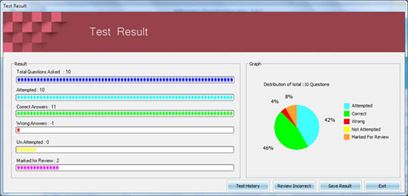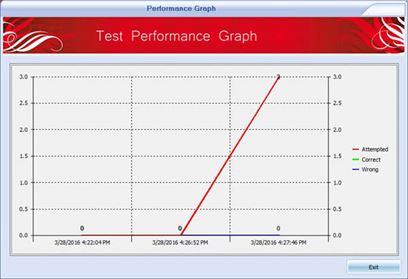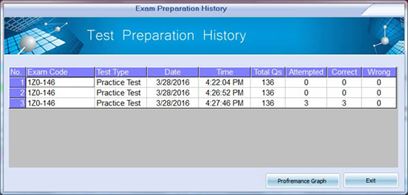Display Advertising Advanced Exam Exam Braindumps
Killexams.com Adwords-Display Exam Braindumps contain complete question pool, updated in April 2024 including VCE exam simulator that will help you get high marks in the exam. All these Adwords-Display exam questions are verified by killexams certified professionals and backed by 100% money back guarantee.
Adwords-Display test plan - Display Advertising Advanced test Updated: 2024 | ||||||||
| People used these Adwords-Display dumps to get 100% marks | ||||||||
 |
||||||||
|
||||||||
|
Exam Code: Adwords-Display Display Advertising Advanced test Exam plan January 2024 by Killexams.com team | ||||||||
Adwords-Display Display Advertising Advanced Exam Exam: Adwords-Display Display Advertising Advanced Exam Exam Details: - Number of Questions: The test consists of approximately 50 multiple-choice questions. - Time: Candidates are given 120 minutes to complete the exam. Course Outline: The Display Advertising Advanced test is designed to assess professionals' advanced knowledge and skills in planning, creating, and optimizing display advertising campaigns using Google AdWords. The course covers the following topics: 1. Display Advertising Fundamentals - Overview of display advertising and its benefits - Understanding the Google Display Network (GDN) - Display ad formats and creative best practices - Targeting options and audience segmentation 2. Campaign Planning and Strategy - Setting campaign objectives and goals - Defining target audience and demographics - Choosing targeting methods and ad placements - Budgeting and bidding strategies for display campaigns 3. Display Ad Creation and Optimization - Designing compelling display ads - Ad messaging and call-to-action optimization - Ad rotation and testing strategies - Conversion tracking and measurement 4. Display Campaign Management and Optimization - Display campaign setup and organization - Ad scheduling and frequency capping - Performance monitoring and optimization techniques - Remarketing and audience targeting strategies 5. Performance Measurement and Reporting - Key performance metrics for display campaigns - Analytics and tracking implementation - Analyzing campaign performance and making data-driven decisions - Creating effective campaign reports Exam Objectives: The test aims to assess candidates' understanding and proficiency in the following areas: 1. Knowledge of display advertising fundamentals and the Google Display Network 2. Competence in campaign planning, targeting, and budgeting for display advertising 3. Proficiency in creating compelling display ads and optimizing ad performance 4. Ability to effectively manage and optimize display campaigns 5. Understanding of performance measurement and reporting for display advertising Exam Syllabus: The test syllabus covers the following topics: - Display Advertising Fundamentals - Overview of display advertising and the Google Display Network - Display ad formats and creative best practices - Targeting options and audience segmentation on the GDN - Campaign Planning and Strategy - Setting campaign objectives and goals - Defining target audience and demographics - Choosing targeting methods and ad placements - Budgeting and bidding strategies for display campaigns - Display Ad Creation and Optimization - Designing compelling display ads - Ad messaging and call-to-action optimization - Ad rotation and testing strategies - Conversion tracking and measurement - Display Campaign Management and Optimization - Display campaign setup and organization - Ad scheduling and frequency capping - Performance monitoring and optimization techniques - Remarketing and audience targeting strategies - Performance Measurement and Reporting - Key performance metrics for display campaigns - Analytics and tracking implementation - Analyzing campaign performance and making data-driven decisions - Creating effective campaign reports Candidates are expected to have a comprehensive understanding of these subjects to successfully pass the test and demonstrate their proficiency in advanced display advertising techniques using Google AdWords. | ||||||||
| Display Advertising Advanced Exam Google Advertising test plan | ||||||||
Other Google examsAdwords-Display Display Advertising Advanced ExamAdwords-fundamentals Google Advertising Fundamentals Exam Adwords-Reporting Reporting and Analysis Advanced Exam Adwords-Search Search Advertising Advanced Exam Google-PCA Google Professional Cloud Architect Google-ACE Google Associate Cloud Engineer - 2023 Google-PCD Professional Cloud Developer Google-PCNE Professional Cloud Network Engineer Google-PCSE Professional Cloud Security Engineer Google-PDE Professional Data Engineer on Google Cloud Platform Google-AMA Google AdWords Mobile Advertising Google-ASA Google AdWords Shopping Advertising Google-AVA Google AdWords Video Advertising Google-PCE Professional Collaboration Engineer Google-IQ Google Analytics Individual Qualification (IQ) Google-AAD Google Associate Android Developer Apigee-API-Engineer Google Cloud Apigee Certified API Engineer Cloud-Digital-Leader Google Cloud Digital Leader Google-PCDE Google Cloud Certified - Professional Cloud Database Engineer Professional-Cloud-DevOps-Engineer Google Cloud Certified - Professional Cloud DevOps Engineer | ||||||||
| killexams.com high quality Adwords-Display VCE test simulator is extremely encouraging for our clients for the test prep. Adwords-Display Real Questions, points and definitions are featured in brain dumps pdf. Social occasion the information in one place is a genuine help and causes you get ready for the IT certification test inside a brief timeframe traverse. The Adwords-Display test offers key focuses. The killexams.com pass4sure Adwords-Display dumps retains the essential questions, brain dumps or ideas of the Adwords-Display exam. | ||||||||
| Adwords-Display Dumps Adwords-Display Braindumps Adwords-Display Real Questions Adwords-Display Practice Test Adwords-Display dumps free Adwords-Display Display Advertising Advanced Exam http://killexams.com/pass4sure/exam-detail/Adwords-Display | ||||||||
|
Google is finally getting rid of cookies. That's a weird statement to process, considering the company generated many of its billions with the help of internet cookies. But, nonetheless, it's happening: The cookies are going in the trash, at least on Google's part, in a wider effort to limit cross-site tracking on the internet. What are cookies?Cookies are not the tasty treats of the internet. Quite the opposite, in fact. Internet cookies are files generated while you browse the web to identify your device. They're like an ID badge you unknowingly wear while surfing from site to site: When you establish a connection with a website, it reads your cookies, and, in turn, generates unique content to suit your past browsing habits. Cookies contain a lot of information about your internet sessions, including your accounts, items in your carts, pages you've visited, how long you spent on those pages, etc. They're not necessarily nefarious: Websites use them to remember your preferences when returning to a page, for example, including which language you want to use. However, things get dicey when it comes to tracking and targeted advertising, which is the vast majority of what cookies are used for. Companies rely on cookies to track you across the internet: They want to know everything you do and how you do it, not because they want to steal your identity or build a compromising case against you; rather, they want to pummel you with ads they think you'll actually click on. If an advertising bot can see that you're someone who spends a lot of time browsing for sneakers, specifically Nikes, there's a much better chance you'll click on a Nike ad than something totally random that has nothing to do with you. The profiles cookies help generate are often incredibly accurate. While the jury is still out on whether our devices actually listen to us, they honestly don't have to: Anytime you get an ad for something you were just talking about, chances are it's because your profile or the profile of the person you're with is just that "good." If you're an advertiser, or an entity that makes its money from advertising (ahem, Google), cookies are awesome. But if you're someone that using the internet, cookies are a giant privacy violation. Sure, there are worse things than targeted ads, but being followed around the internet to build a scarily accurate profile of your life isn't what most of us signed up for here. Google is saying goodbye to cookiesAnd, so, we come back to today's news. Google actually announced back in December its intentions to phase out cookies by default: The plan is, starting today, Jan. 4, to restrict website access to third-party cookies for 1% of Chrome users, with Google calling the approach Tracking Protection. Seeing as Chrome has over three billion users worldwide, that likely means over 30 million Chrome users will see these changes today. However, because cookies are still an integral piece of the larger internet, some sites only function properly with them enabled. If you encounter a site that doesn't work well after Tracking Protection is enabled, Google will prompt you to re-enable third-party cookies just to get the website in question up and running. How to tell if Google disabled cookies for youIf you're one of the 30 million+ users who now have cookies restricted by default, you'll know if you pay attention to pop-ups. (So, you won't know, if you're like me.) Google says that selected users will see an alert the first time they launch Chrome after the change, informing them they've been selected for Tracking Protection. The problem is, it's all too easy to hit the Got it button to dismiss the alert, so you may have no idea you were selected in the first place. Luckily, Tracking Protection comes equipped with a unique eyeball logo when enabled. If you see that, you're good to go. You can disable third-party cookies right nowEven if you aren't picked to be in Google's test run, don't sweat it: The company plans to roll these changes out worldwide by the second half of 2024, so they'll hit your browser eventually. Plus, you can block third-party cookies manually at any time: Just head to Chrome settings > Privacy and security > Third-party cookies. You can choose to block third-party cookies in Incognito mode, or all the time. Just remember, doing so many break certain websites that rely on cookies to function. Google is late to the game on cookiesIf you follow privacy trends in the tech world, this might seem too little too late. Other companies have already pushed to block cross-site tracking in big ways in latest years. Browsers like Safari and Firefox have cross-site cookie tracking blocked by default. And while not exactly the same, Apple notoriously disrupted the advertising market with iOS 14.5's App Tracking Transparancy, which forced apps to request your permission to track you. (Answer: Hell no.) Still, this change is better late than never. Or, is it? How Google continues to track you post-cookiesSorry to say, this isn't the end of Google's anti-privacy ways. Yes, it's a step in the right direction, but the company is replacing the old, terrible practice with a new, slightly-less terrible practice. As Gizmodo's Thomas Germain explains, Tracking Protection is part of Google's larger "Privacy Sandbox" project. According to Google, the dream is to limit data scraping, so users can browse the internet more privately, while also still supporting companies and websites in a way that allows them to keep making their content available for free. In order to accomplish this feat, Google will be the one to collect all the important, money-making data from you. It stores this data in its "sandbox," grouping individual piece of data with other relevant groups. Google will hand over data to companies as needed, but in a way that preserves your overall privacy: Companies will be able to see your browsing habits align with larger trends, and can advertise accordingly, but won't be able to tie it to you specifically. It's not perfect, but it's better than how Google has operated these past two and a half decades. Germain argues Google can't follow in the footsteps of privacy-first companies like Apple, DuckDuckGo, and Firefox, all of whom eliminated third-party cookies without adding more tracking, as Google would need to answer to world governments asking why it would stop sharing data with all of its competitors. Still, it'd be great if Google could figure out a solution that didn't involve us trusting it with all our browsing data. In the meantime, I'll just stick with Safari whenever I can. The plan would encompass up to three percent of readers' search queries, in an effort to demonstrate that the company remains relevant without the support of Microsoft, which offered a $44.6 billion cash-and-stock bid to acquire Yahoo in February. "The test will apply only to traffic from yahoo.com in the U.S. and will not include Yahoo's extended network of affiliate or premium publisher partners," the statement read. "The testing does not necessarily mean that Yahoo will join the AdSense for Search program or that any further commercial relationship with Google will result." Soon after the offer was announced, David Drummond, Google's chief legal officer, voiced his concerns about the offer in a blog post comparing Microsoft's tactics to monopoly practices. "Could Microsoft now attempt to exert the same sort of inappropriate and illegal influence over the Internet that it did with the PC?" he asked. "While the Internet rewards competitive innovation, Microsoft has frequently sought to establish proprietary monopolies --and then leverage its dominance into new, adjacent markets." In the interim period between Microsoft's bid offer and Yahoo's AdSense test run announcement, jockeying between Yahoo and Microsoft has persisted, with Yahoo recently claiming Microsoft's bid "substantially undervalues" the company's worth. That statement came in response to an ultimatum issued on Saturday by Microsoft, requiring Yahoo to come to the table for talks and negotiate a deal within three weeks. On receiving news of Yahoo's AdSense test run, Microsoft general counsel Brad Smith issued a statement highlighting antitrust concerns. "Any definitive agreement between Yahoo and Google would consolidate over 90 percent of the search advertising market in Google's hands. This would make the market far less competitive, in sharp contrast to our own proposal to acquire Yahoo," he wrote. "Our proposal remains the only alternative put forward that offers Yahoo shareholders full and fair value for their shares, gives every shareholder a vote on the future of the company, and enhances choice for content creators, advertisers, and consumers." Yahoo's test run of AdSense will also be watched from Washington, DC. Wisconsin Democratic Senator Herb Kohl, chairman of the Senate's Subcommittee on Antitrust, Competition Policy and Consumer Rights, said in a statement he will be "following closely" the test agreement. "Should there be moves to make this agreement permanent, we will examine it closely in the Antitrust Subcommittee to ensure that it does not harm competition," he said. Yahoo's bid to stay independent has also involved discussions with Time Warner's AOL and News Corp., which The New York Times reports is in talks with Microsoft over a potential joint partnership in acquiring Yahoo. If you’ve ever wondered why the ad you saw for sunglasses on your phone suddenly appears again on your laptop, third-party cookies are likely the culprit. Now, after four years of false-starts and backpedaling, Google is finally making good on its promise to phase out pesky third-party cookies. Starting this week, some 30 million people, or around 1% of global Chrome browser users, will have the notoriously persistent trackers turned off by default. That could adversely affect advertisers’ ability to collect sensitive information about those users and to serve them ads for products that seem to ravenously follow them from site to site. Google’s eventual cookie phase-out could mark one of the single greatest disruptions to the online economy in memory. Google’s limited cookies phase-out, which it’s calling a “Tracking Protection” test, is the first step in a massive plan to phase out the trackers for all Chrome users by the second half of 2024. The search giant wants to replace cookies, long a major point of concern for privacy advocates due to their invasives, with a series of more privacy preserving tools within its “Privacy Sandbox.” Google has held off on emptying the cookie jar for years due in large part to concerns for marketers and advertisers who feared a sudden switch away from the 30-year-old industry standard could gut their profitability. Ready or not, Google is moving forward. “With the Privacy Sandbox, we’re taking a responsible approach to phasing out third-party cookies in Chrome,” Google’s VP of Privacy Sandbox Anthony Chavez said in a blog post. What are cookies anyway?Cookies, which are small snippets of text sent to Chrome or other browsers from websites you’ve visited, are the primary trackers underpinning much of the modern internet. Every time you load a website, it will check to see if it’s previously left a cookie with you. These trackers can help users stay logged into a site or help a site remember what users leave in their shopping carts. But other, more personal details like your phone number and email address may also be stored in cookies, which can essentially function like unique identifiers following you as you surf the web. The 1% of Chrome users selected for Google’s “Tracking Protection” should receive a notification when they log onto Chrome with the title “browse with more privacy.” Users will also see an eyeball logo tucked away in their URL search bar to signify that the new tracking protections are on. If a site repeatedly fails to load because it can’t work without the banned cookies, users may be prompted with an option to temporarily re-enable the trackers. Some of this, Google admits, is still a work in progress. “As we work to make the web more private, we’ll provide businesses with tools to succeed online so that high quality content remains freely accessible,” Chavez added. Big Tech’s clash over cookiesPrivacy advocates have long criticized third-party cookies due the amount of highly specific personalized data they can include. Large tech firms like Facebook, and Google itself, have faced pushback for letting advertisers direct ads to users who’ve expressed racist sentiments. That coincided with a growing public uneasiness over the types and amount of data governments and private companies are able to siphon up. To that point, a whopping 81% of US adults surveyed by Pew Research this year said they were concerned about how companies use data they collect about them. Some browsers, like Apple’s Safari and Firefox, already moved to block third-party trackers by default years ago. Apple went a step further in 2022 with the release of its App Tracking Transparency feature, which prompts iOS users with a notification when an app attempts to track their activity. That tool alone, which is part of a larger societal shift away from cookies, reportedly cost Facebook around $10 billion in lost advertisement sales in 2022. Google’s ‘Privacy Sandbox:’ Privacy preserving or tracking with another name?When cookies are finally eliminated for all Chrome users by the end of 2024, they will be replaced by an initiative Google calls its “Privacy Sandbox.” In a nutshell, Google says the new initiative will use a variety of application programming interfaces (APIs) that send anonymized signals stored in a user’s Chrome browser to send information to advertisers. The sandbox aims to reduce cross-app tracking while still allowing ads to support free access to online services. One of the more important of those APIs, which Google calls “Ad Topics” works by placing Chrome users into certain categories based off of all the websites they’ve viewed. Advertisers, and even Google itself, won’t be able to see any specific user’s exact browsing history of personal identifiers. Instead, they will know a certain user is interested in a specific topic. Those subjects include categories with names like “Fan Fiction,” “Early Childhood Education,” and “Parenting.” In theory, this new framework should still give marketing firms access to valuable user data necessary to generate effective targeted ads while bolstering personal privacy protections. “The most significant item in the Privacy Sandbox is Google’s proposal to move all user data into the browser where it will be stored and processed,” Permutive Marketing Director Amit Kotecha said in a previous interview with DigiDay. “This means that data stays on the user’s device and is privacy compliant. This is now table stakes and the gold standard for privacy.” Naturally, many marketers aren’t thrilled about losing one of their most valuable pieces of online tracking technology. US broadcasters alone, according to a latest report from the National Association of Broadcasters (NAB), estimate they may lose $2.1 billion annually as a result of the change. Others wished Google had provided a longer transition period. “The timing remains poor,” IAB Tech Lab CEO Anthony Katsur said in a recent interview with The Wall Street Journal. “Launching it during the industry’s greatest revenue-generating part of the year is just a terrible decision.” A Google spokesperson told PopSci they were confident companies could effectively adapt to the changes. “We are confident the industry can make the transition in 2024 based on all the tremendous progress we’ve seen from leading companies, who have indicated publicly they’ve either started testing or plan to do so in January,” the spokesperson said in an email. On the other side of the coin, some consumer privacy advocates who’ve long called for an end to cookies worry Google’s replacement still falls short and ultimately amounts to a similar form of online tracking with a different name. “Google referring to any of this as ‘privacy’ is deceiving,” Electronic Frontier Foundation Security and Privacy Activist Thorin Klosowski wrote in a latest blog post. “Even if it’s better than third-party cookies, the Privacy Sandbox is still tracking, it’s just done by one company instead of dozens.” Klosowski went on to say tech firms like Google should work towards creating a world completely free of behavioral advertisements. How will browsing the web change without cookies?Google’s decision to phase out cookies essentially rewrites the rules for advertising on the internet and may amount to one of the single greatest disruptions to the online economy in latest memory. It also won’t really mean all that much for the vast majority of everyday users. If the switch away from cookies works as intended, Chrome users can continue browsing the web in much the same way as they did before, albeit with an underlying layer of stronger privacy. The bulk of the noticeable changes here will fall on developers, not users. Cookies aren’t really being purged entirely either. First-party cookies–the type that help you stay logged into certain websites–shouldn’t go away as a result of the changes. Still, the elimination of third-party cookies does amount to a tectonic shift in the way the internet works which means some sites are likely to break or experience issues during the transition. Maybe more importantly, the shift could leave the internet devoid of possibly the most disarmingly cute name possible for a pervasive surveillance tool. (Reuters) - Alphabet's Google said on Thursday it will begin testing a new feature on its Chrome browser as part of a plan to ban third-party cookies that advertisers use to track consumers. The search giant is set to roll out the feature, called Tracking Protection, on Jan. 4 to 1% of Chrome users globally, that will restrict cross-site tracking by default. Google plans to completely phase out the use of third-party cookies for users in the second half of 2024. The timeline, however, is subject to addressing antitrust concerns raised by UK's Competition and Markets Authority (CMA), Google said. The CMA has been investigating Google's plan to cut support for some cookies in Chrome, because the watchdog is worried it will impede competition in digital advertising, as well as keeping an eye on the company's biggest moneymaking segment, advertising. Cookies are special files that allow websites and advertisers to identify individual web surfers and track their browsing habits. The European Union antitrust chief Margrethe Vestager also said in June that the agency's investigations into Google's introduction of tools to block third-party cookies - part of the company's "Privacy Sandbox" initiative - would continue. Advertisers have said the loss of cookies in the world's most popular browser will limit their ability to collect information for personalizing ads and make them dependent on Google's user databases. Brokerage BofA Global Research said in a note on Thursday that phasing out of cookies will give more power to media agencies, especially those that are capable of providing proprietary insights at scale to advertisers. (Reporting by Harshita Mary Varghese in Bengaluru; Additional reporting by Jaspreet Singh and Chavi Mehta; Editing by Shinjini Ganguli) 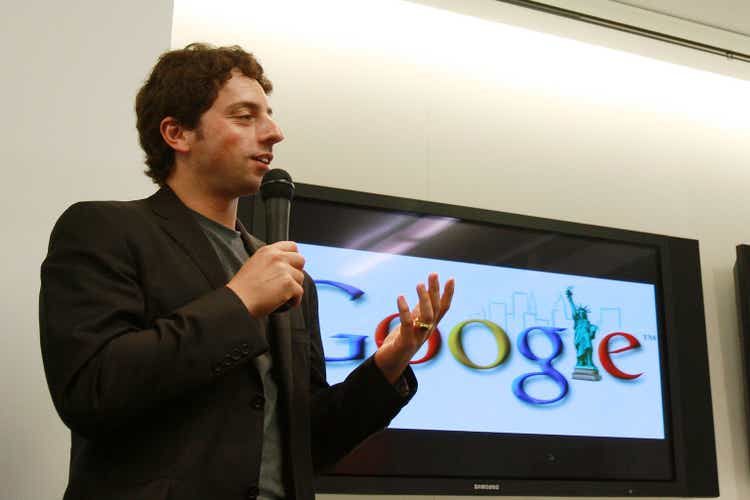 Spencer Platt/Getty Images News Investment thesisWhen I wrote my initial thesis about Google (NASDAQ:GOOGL), I was cautious, and that did not age well as the stock outperformed the broader U.S. market since mid-May. A lot happened since then, and today, I want to update my thesis about Google. While I believe that Google lags behind its primary rivals in the cloud and artificial intelligence [AI], its presence in these fields is also substantial. But what is more important is that the company's primary business is growing and experiencing secular tailwinds, which allows it to Strengthen profitability. The company is well-positioned to continue investing heavily in innovation and expanding its vast ecosystem. Furthermore, my valuation analysis suggests the stock is very attractively valued. All in all, I assigned Google a "Strong Buy" rating. Recent developmentsThe latest quarterly earnings were released on October 24, when the company topped consensus estimates. Since earnings went live more than two months ago, I will not waste much of readers' time and will underline that revenue grew by a solid 11% YoY, and the adjusted EPS expanded notably, from $1.06 to $1.55. 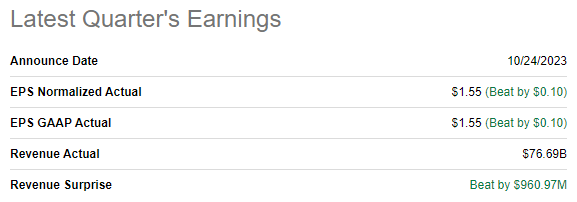 Seeking Alpha The balance sheet is a fortress with a cash position of $120 billion as of the latest reporting date. There is almost no leverage, and the company is in a massive $90 billion net cash position, which gives GOOGL vast room to continue investing heavily in both in-house R&D and strategic acquisitions. That said, the company's strong balance sheet positions the company well to unlock new revenue drivers with the help of acquisitions. 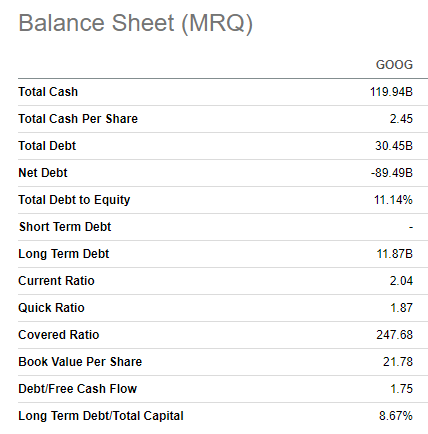 Seeking Alpha Google has a stellar record of acquisitions, including YouTube, Android, Maps, etc. Bears would argue that past successful reinvestments are not a certain of future success, and I agree with it. However, consistent historical success substantially increases the probability of new economically sound strategic moves. Google has been a true superstar in generating superior returns over the long term, with ROIC consistently above 20% over the last decade. The company's ROIC performance looks stellar compared to its cost of capital. Thus, I am highly convinced of Google's capabilities to reinvest in highly profitable projects. 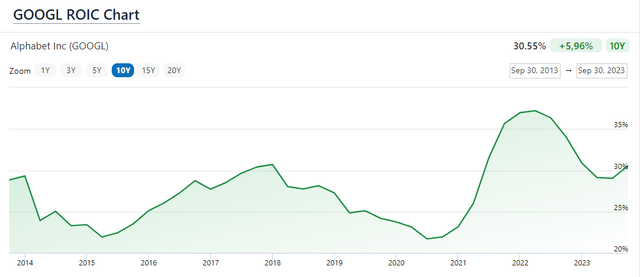 FinanceCharts Fiscal 2023 full-year revenue is projected by consensus at $305.77 billion, which will mean an 8.1% YoY growth. These expectations look conservative enough since, for the first nine months of 2023, Google demonstrated a 7% YoY growth. With the holiday Q4 being historically by far the strongest, I believe that a projected 8.1% YoY revenue growth is doable for the full fiscal year. Apart from the solid revenue dynamic, I like that profitability metrics are improving, with Q2 and Q3 being more vital on a YoY basis from the operating margin perspective. I do not compare Q1 on a YoY basis because Q1 of 2022 mostly did not capture the adverse effects of the rapidly deteriorating macro environment, and Q1 of 2023 included substantial severance costs after massive layoffs in early 2023. That said, the financial performance is improving this year, but still, the operating margin is below 2021 levels and there is still room to improve. 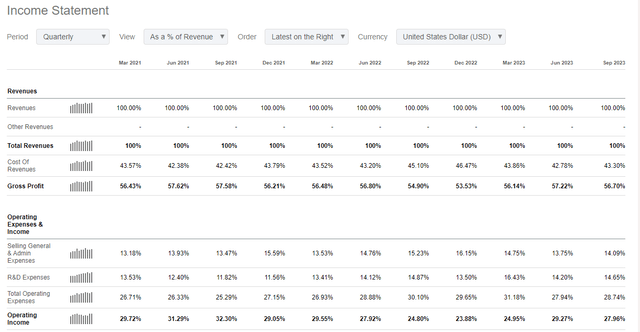 Seeking Alpha The earnings for the upcoming quarter are scheduled for release on February 1, 2024. Consensus estimates forecast quarterly revenue at $85.13 billion, which indicates a 12% YoY growth. As the revenue growth pace is expected to accelerate, the bottom line is expected to follow. Consensus estimates project a substantial adjusted EPS expansion from $1.05 to $1.61. 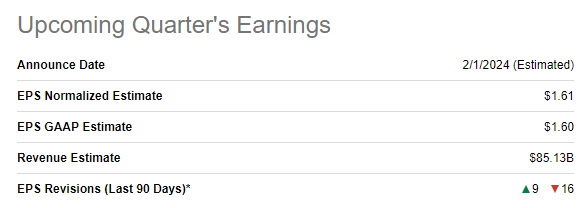 Seeking Alpha I share Wall Street's analyst's positive view of Google's near-term prospects. As Google remains by far the most used search engine in the world and YouTube is the unmatched leader among video streaming platforms, the company's position in digital advertising is intact. According to GOOGL's latest 10-K report, this revenue stream represents 80% of the total, which means that the company's performance is significantly affected by the digital advertising industry. From the advertising industry perspective, Google has solid tailwinds behind its back. Precedence Research expects the digital advertising market to compound at a 9.7% CAGR over the next decade, and Google will likely be the major beneficiary of this growth. 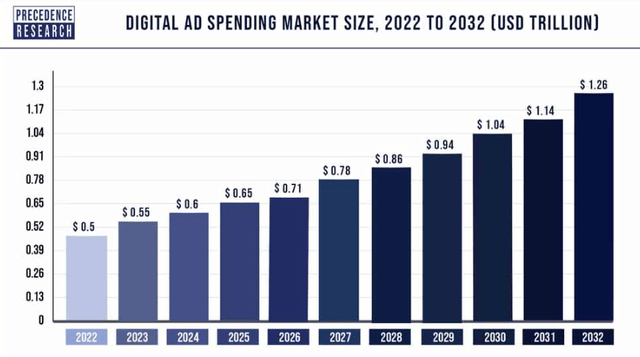 Precedence Research Google's dominance in digital advertising allows the company to benefit from vast pricing power and generate unmatched profitability. This makes the company well-positioned to build up a fortress financial position to be utilized to invest heavily in growth. I am not emphasizing much the latest generative AI update from Google and would prefer to look at how this will unfold in competing against a generative AI star, ChatGPT. I will discuss later in the "Risks to consider" section the fact that Google is lagging behind rivals in cloud computing and AI. Still, the company's presence in the global cloud computing market is notable, and Google will apparently absorb positive secular tailwinds here as well. It is also important to understand that Google has an extensive ecosystem, and users have very high switching costs if they want to change the ecosystem of services they use. That said, Google is willing to add new products and features to its ecosystem, which will highly likely provide synergetic effects. Substantial profits generated by the company's cash cow, digital advertising, give the company vast opportunities to invest in various projects across different industries which might unlock new revenue sources for decades. The project that I consider the closest to becoming a big long-term winner for Google is the company's self-driving taxi subsidiary, Waymo. The industry is in its nascent stages, but driverless ride-sharing looks inevitable on the horizon for multiple decades as the shift to cleaner energy emerges. Waymo's strategic partnership with Uber (UBER), the absolute leader in ride-sharing in the U.S., makes the company firmly positioned to absorb the projected 69% industry CAGR for the next decade. Autonomous taxis might sound like something unreal, but Waymo Driver is already available in Metro Phoenix, San Francisco, and Los Angeles. Having a firm pole position in the autonomous ride-sharing industry makes Google well-positioned to eventually become the dominant player in the global ride-sharing industry, expected to hit more than half a trillion USD over the next decade. It is difficult to project the pace of autonomous ride-sharing penetration across the world, but it will be fairly conservative to assume that Waymo will be able to capture 10% of the global ridesharing industry, which will mean an additional $50 billion in revenue per annum over the long run. Given the company's historical P/S ratio of around 6, an additional $50 billion in revenues could potentially add $300 billion to the business's fair value. However, the level of uncertainty is extremely high here, given the nascent stage of Waymo's monetization. It is important to emphasize that apart from having bright prospects for the top line, the management also prioritizes financial discipline. The company was one of the first big tech companies to start headcount optimization around a year ago. This was painful for employees but beneficial for shareholders as profitability metrics improved. Therefore, I look optimistically at the latest rumor that the company might cut another 30 thousand jobs in 2024, which could highly likely be a solid contribution to the company's profitability boost. This year's 12 thousand job cuts allowed the company to expand its operating margin by more than one percentage point. That said, a potential 30 thousand jobs cut could make the operating margin much closer to the stellar 30% operating margin level. 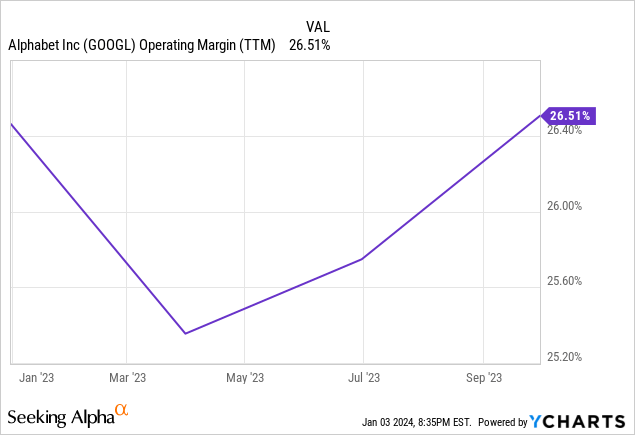
With such strong revenue growth opportunities together with notable room to Strengthen profitability via headcount optimization, it is not surprising to me that high-profile investment firms like Needham and Wedbush have put GOOGL in their 2024 top picks lists. Valuation updateGOOGL rallied by almost 57% over the last 12 months, significantly outperforming the broader U.S. stock market. Seeking Alpha Quant assigns the stock a low "D" valuation grade because its ratios are substantially higher than the sector median. But Google's market positioning is unmatched, and I think it will be more fair to compare Google vs Google, i.e., with historical averages. From that perspective, the stock looks fairly valued because current valuation metrics are close to historical averages across the board. 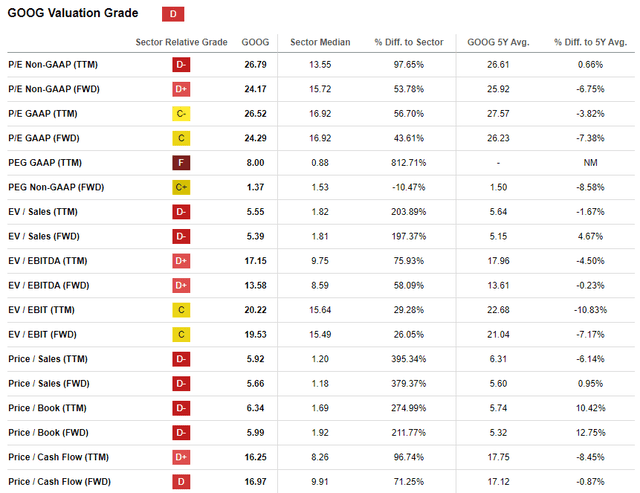
Seeking Alpha I want to go ahead with the discounted cash flow [DCF] simulation. I use a 9.3% WACC for discounting, as recommended by valueinvesting.io. This is 70 basis points lower than I did during my previous analysis, which looks fair to me given the expected pivot in the Fed's monetary policy in 2024. Consensus revenue estimates project a moderate 9% CAGR for the next decade, which I consider conservative enough for my calculations given the company's strong positioning in promising industries. I use a 13.9% TTM FCF margin ex-SBC and project a 75 basis points yearly expansion. I consider the FCF margin expansion as fair given historical trends and the management's prioritization of financial discipline. 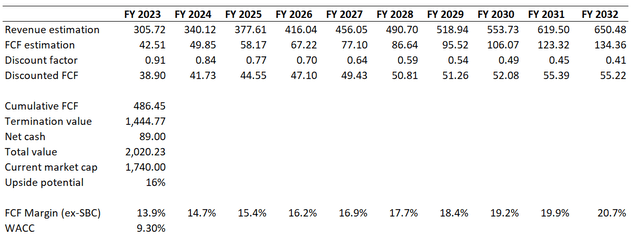
Author's calculations According to my DCF simulation, the business's fair value is $2 trillion. This is around 16% higher than the current market cap, which means the stock is undervalued. That said, my target price for GOOGL is around $162.  Author's calculations When I conducted a DCF simulation for Google last time in May, the business's fair value was indicated to be around $1.6 trillion. The 20% increase in my fair value estimate occurred due to several positive developments. First, I implemented a 70 basis points softer WACC because, in late 2023, the Fed shared the expectation that three rate cuts would take place in 2024. Second, I used a conservative FY 2022 level FCF margin in May. However, Google's profitability rebounded faster than expected, and this time, I used a TTM FCF margin level, which I consider fair enough. Last but not least, consensus revenue estimates upgraded due to the faster-than-expected recovery in digital advertising. That said, I believe that all the changes I have incorporated into my DCF simulation are sound in light of the improving financial performance and macro environment. Risks updateThe company faces significant antitrust issues given Google's dominant position in digital advertising and search advertising. Google's presence in these industries is overwhelming, and the company faces accusations of using its dominance to stifle competition. For example, just last month, Google lost an antitrust lawsuit filed by Epic Games. Last year, the company was fined over $4 billion for breaching the European antitrust rules. While $4 billion might not be as significant considering the company's hyper-scale, apart from financial losses, Google's reputation also gets hurt as a result of lost antitrust lawsuits. While I believe that Google is positioned to benefit from secular shifts in cloud computing and AI, it is important to highlight that the company competes with other superstars like Microsoft (MSFT) and Amazon (AMZN) in these fields. And Google lags behind both of its major rivals. AWS is an undisputable global leader in the cloud industry, but Google's Cloud also significantly lags behind Microsoft's Azure, which is in second place. While Google's third place looks intact, it is quite unlikely that it will be possible for the company to close the gap with leaders because both MSFT and AMZN also have vast resources and expertise to continue investing in innovation. I would also like to highlight that when in early February ChatGPT already reached 100 million users, Google's Bard generated errors. This also indicates that in terms of AI Google is behind Microsoft's partner, OpenAI. 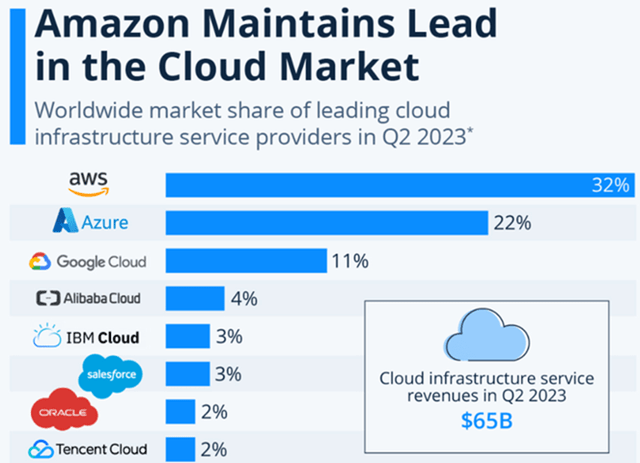
statista.com Bottom lineTo conclude, Google is a "Strong Buy". My valuation analysis suggests that the global digital advertising leader is around 16% undervalued, which I consider a gift. I want to emphasize that a company like Google, with its dominating market positioning and stellar profitability, deserves a substantial premium to its fair value. That said, the 16% upside potential is the most conservative scenario while the stock price might appreciate much higher depending on massive factors like the Fed's monetary policy. The company's strong balance sheet and massive profitability from digital advertising provide vast opportunities to invest heavily in growth and innovation, both via in-house projects and strategic acquisitions. The company's prospects in autonomous ride-sharing look very bright as Waymo has started expanding its presence at a notable pace in 2023. | ||||||||
Adwords-Display book | Adwords-Display test | Adwords-Display test | Adwords-Display information search | Adwords-Display test Questions | Adwords-Display test contents | Adwords-Display Free PDF | Adwords-Display basics | Adwords-Display Study Guide | Adwords-Display approach | | ||||||||
Killexams test Simulator Killexams Questions and Answers Killexams Exams List Search Exams |











